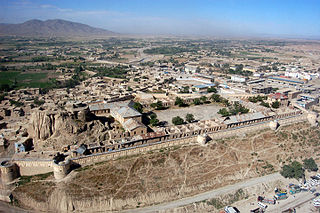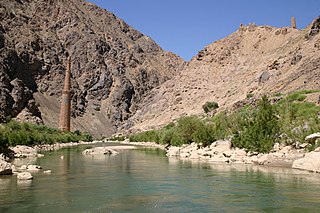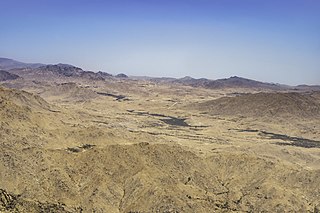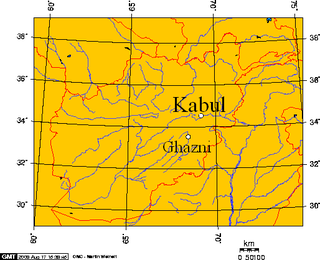
Herāt is an oasis city and the third-largest city of Afghanistan. In 2020, it had an estimated population of 574,276, and serves as the capital of Herat Province, situated south of the Paropamisus Mountains in the fertile valley of the Hari River in the western part of the country. An ancient civilization on the Silk Road between the Middle East, Central and South Asia, it serves as a regional hub in the country's west, and its historic Persian influences has given it the nickname as Afghanistan's Little Iran.

Gardez is the capital of the Paktia Province of Afghanistan. The population of the city was estimated to be ca. 10,000 in the 1979 census and was estimated to be 70,000 in 2008. The majority of the city's native population is Tajik. But recently, with the migration of Pashtun tribes from different parts of Paktia to this city, Pashtuns have taken over the majority of the population of this city. The city of Gardez is located at the junction between two important roads that cut through a huge alpine valley. Surrounded by the mountains and deserts of the Hindu Kush, which boil up from the valley floor to the north, east and west, it is the axis of commerce for a huge area of eastern Afghanistan and has been a strategic location for armies throughout the country's long history of conflict. Observation posts built by Alexander the Great are still crumbling on the hilltops just outside the city limits. The city of Gardez has a population of 70,641. It has 13 districts and a total land area of 6,174 hectares (23.84 sq mi). The total number of dwellings in this city is 7,849.

Ghazni, historically known as Ghaznin (غزنين) or Ghazna (غزنه) and also transliterated as Ghuznee, is a city in southeastern Afghanistan with a population of around 190,000 people. The city is strategically located along Highway 1, which has served as the main road between Kabul and Kandahar for thousands of years. Situated on a plateau at 2,219 metres (7,280 ft) above sea level, the city is 150 kilometres (93 mi) south of Kabul and is the capital of Ghazni Province.

Afghanistan is divided into 34 provinces. The provinces of Afghanistan are the primary administrative divisions. Each province encompasses a number of districts or usually over 1,000 villages.

Ghazni is one of the 34 provinces of Afghanistan, located in southeastern Afghanistan. The province contains 19 districts, encompassing over a thousand villages and roughly 1.3 million people, making it the 5th most populous province. The city of Ghazni serves as the capital. It lies on the important Kabul–Kandahar Highway, and has historically functioned as an important trade center. The Ghazni Airport is located next to the city of Ghazni and provides limited domestic flights to Afghanistan's capital, Kabul.

Ghōr, also spelled Ghowr or Ghur, is one of the thirty-four provinces of Afghanistan. It is located in the western Hindu Kush in central Afghanistan, towards the north-west. The province contains eleven districts, encompassing hundreds of villages, and approximately 764,472 settled people. Firuzkoh, serves as the capital of the province.

The Ghiljī also spelled Khilji, Khalji, or Ghilzai or Ghilzay (غلزی), are one of the largest Pashtun tribes. Their traditional homeland is Ghazni and Qalati Ghilji in Afghanistan but they have also settled in other regions throughout the Afghanistan-Pakistan Pashtun belt. The Khilji dynasty was a dynasty in Delhi Sultanate founded by Jalaluddin Khalji and expanded by Alauddin Khalji who were from Ghilji tribe. The modern nomadic Kochi people are predominantly made up of Ghilji tribes. The Ghilji make up around 20-25% of Afghanistan's total population.

Jaghori is one of the main districts of the Ghazni province in Afghanistan. It is located in the highlands in the southern fringes of the Hazaristan region. It occupies 1,855 km2. in the upper Arghandab valley. The population is estimated to be around 560,000 in 2015. The district capital, Sange-e-Masha, is where major business transactions take place. The district is heavily dependent on agriculture, and migrant workers as the main sources of income. Other major marketplaces are in Ghojor, Hotqol and Anguri.
Malistan or Malestan is a district in the west of Daykundi Province, Afghanistan. Its population, which is 100% Hazara, was estimated at 350,000 in 2009. The district capital is Mir Adina.
Hajii Sher Alam Ibrahimi was the governor of Ghazni Province from around 2005–2006 until 2007 and is a major commander aligned with Ittihad-i Islami and Abdul Rasul Sayyaf, having fought with him in the Afghan Civil War.

Asadullah Khalid is a politician in Afghanistan. He served as head of the National Directorate of Security (NDS), which is the domestic intelligence agency of Afghanistan. Before his appointment as the head of the NDS in September 2012, Khalid served as the Minister of Tribal and Border Affairs. Between 2005 and 2008, he was the Governor of Kandahar Province and prior to that as Governor of Ghazni Province (2002-2005). From 2018 until 2021 he was the Minister of Defense. Khalid is said to be affiliated with the Islamic Dawah Organisation of Afghanistan and has been noted as one of many loyalists of Afghan President Hamid Karzai.

Ghazni District is a district of Ghazni Province, Afghanistan situated in the northeast part of the province. Capital of the district is Ghazni, which is also capital of Ghazni Province.

Mihtarlam, also spelled Mehtar Lam, is the sixteenth-largest city of Afghanistan. It is the capital of Laghman Province and center of Mihtarlam District. It is the only large urban settlement in the province. The town is situated in the valley formed by the Alishang and Alingar rivers, 47 km northwest of the city of Jalalabad. There is a paved road between the cities that takes approximately one hour to travel by car.

Ghazni University is a public university in Ghazni, a city in central Afghanistan. It was established in 2008 and began with two faculties, the Faculty of Agriculture and the Faculty of Education. The university's first rector was Ahmad Shah Rafiqi. During its inaugural semester, the university had around 110 students. As of 2019, the university has five faculties and enrolls around 4,000 students, 540 of which are women.
Osman Osmani was appointed as the governor of Ghazni Province, Afghanistan in June 2008. He was succeeded by Musa Khan Ahmadzai in 2010. He was governor when Aafia Siddiqui was arrested outside his compound in Ghazni on July 17, 2008.

Ghazni Airport is located in Ghazni, Afghanistan, next to the main Ghazni-Kandahar Highway. It serves the population of Ghazni and other nearby Afghan provinces. The airport is mainly used for civilian flights and is still being developed as of late 2013.

Muhammad Arif Shah Jahan is the current governor of Wardak province and the former governor of Farah province in Afghanistan. He was appointed as governor of Wardak province by President Ashraf Ghani in place of Zundi Gul Zamani in 17 February 2018. He was previously the representative of the people of Ghazni province in Afghanistan Parliament.

The Ghazni offensive began on 10 August 2018, when Taliban fighters launched an assault on the city of Ghazni, Afghanistan's sixth largest city and one which has been culturally and strategically important for much of the country's history. The attack resulted in the deaths of hundreds of insurgents, soldiers, police, and civilians. The city also sustained large-scale property damage. The battle, occurring only weeks before Afghanistan's 2018 parliamentary election, was the largest since a three-day truce in June had raised hopes of peace talks.
On 17 October 2017, insurgents attacked Gardez, Paktia Province and Ghazni Province in Afghanistan.




























